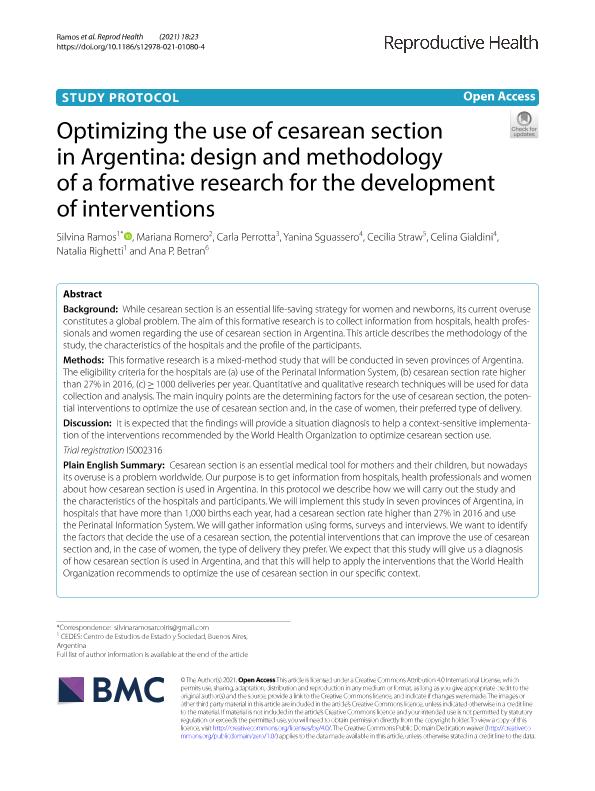Mostrar el registro sencillo del ítem
dc.contributor.author
Ramos, Silvina
dc.contributor.author
Romero, Mariana

dc.contributor.author
Perrotta, Carla
dc.contributor.author
Sguassero, Yanina

dc.contributor.author
Straw, Cecilia

dc.contributor.author
Gialdini, Celina
dc.contributor.author
Righetti, Natalia

dc.contributor.author
Betran, Ana P.
dc.date.available
2022-08-26T20:11:32Z
dc.date.issued
2021-12
dc.identifier.citation
Ramos, Silvina; Romero, Mariana; Perrotta, Carla; Sguassero, Yanina; Straw, Cecilia; et al.; Optimizing the use of cesarean section in Argentina: design and methodology of a formative research for the development of interventions; BioMed Central; Reproductive Health; 18; 1; 12-2021; 1-7
dc.identifier.issn
1742-4755
dc.identifier.uri
http://hdl.handle.net/11336/166760
dc.description.abstract
Background: While cesarean section is an essential life-saving strategy for women and newborns, its current overuse constitutes a global problem. The aim of this formative research is to collect information from hospitals, health professionals and women regarding the use of cesarean section in Argentina. This article describes the methodology of the study, the characteristics of the hospitals and the profile of the participants. Methods: This formative research is a mixed-method study that will be conducted in seven provinces of Argentina. The eligibility criteria for the hospitals are (a) use of the Perinatal Information System, (b) cesarean section rate higher than 27% in 2016, (c) ≥ 1000 deliveries per year. Quantitative and qualitative research techniques will be used for data collection and analysis. The main inquiry points are the determining factors for the use of cesarean section, the potential interventions to optimize the use of cesarean section and, in the case of women, their preferred type of delivery. Discussion: It is expected that the findings will provide a situation diagnosis to help a context-sensitive implementation of the interventions recommended by the World Health Organization to optimize cesarean section use. Trial registration IS002316 Plain English Summary: Cesarean section is an essential medical tool for mothers and their children, but nowadays its overuse is a problem worldwide. Our purpose is to get information from hospitals, health professionals and women about how cesarean section is used in Argentina. In this protocol we describe how we will carry out the study and the characteristics of the hospitals and participants. We will implement this study in seven provinces of Argentina, in hospitals that have more than 1,000 births each year, had a cesarean section rate higher than 27% in 2016 and use the Perinatal Information System. We will gather information using forms, surveys and interviews. We want to identify the factors that decide the use of a cesarean section, the potential interventions that can improve the use of cesarean section and, in the case of women, the type of delivery they prefer. We expect that this study will give us a diagnosis of how cesarean section is used in Argentina, and that this will help to apply the interventions that the World Health Organization recommends to optimize the use of cesarean section in our specific context.
dc.format
application/pdf
dc.language.iso
eng
dc.publisher
BioMed Central

dc.rights
info:eu-repo/semantics/openAccess
dc.rights.uri
https://creativecommons.org/licenses/by/2.5/ar/
dc.subject
ARGENTINA
dc.subject
CESAREAN SECTION
dc.subject
PUBLIC HOSPITALS
dc.subject
QUALITATIVE RESEARCH
dc.subject.classification
Ciencias Sociales Interdisciplinarias

dc.subject.classification
Otras Ciencias Sociales

dc.subject.classification
CIENCIAS SOCIALES

dc.title
Optimizing the use of cesarean section in Argentina: design and methodology of a formative research for the development of interventions
dc.type
info:eu-repo/semantics/article
dc.type
info:ar-repo/semantics/artículo
dc.type
info:eu-repo/semantics/publishedVersion
dc.date.updated
2022-08-25T13:54:56Z
dc.journal.volume
18
dc.journal.number
1
dc.journal.pagination
1-7
dc.journal.pais
Reino Unido

dc.journal.ciudad
Londres
dc.description.fil
Fil: Ramos, Silvina. Centro de Estudios de Estado y Sociedad; Argentina
dc.description.fil
Fil: Romero, Mariana. Consejo Nacional de Investigaciones Científicas y Técnicas; Argentina. Centro de Estudios de Estado y Sociedad; Argentina
dc.description.fil
Fil: Perrotta, Carla. Universidad de Dublin; Irlanda. National University of Ireland Galway; Irlanda
dc.description.fil
Fil: Sguassero, Yanina. Centro Rosarino de Estudios Perinatales; Argentina
dc.description.fil
Fil: Straw, Cecilia. Universidad de Buenos Aires. Facultad de Ciencias Sociales; Argentina. Centro de Estudios de Estado y Sociedad; Argentina
dc.description.fil
Fil: Gialdini, Celina. Centro Rosarino de Estudios Perinatales; Argentina
dc.description.fil
Fil: Righetti, Natalia. Centro de Estudios de Estado y Sociedad; Argentina
dc.description.fil
Fil: Betran, Ana P.. Organizacion Mundial de la Salud; Argentina
dc.journal.title
Reproductive Health
dc.relation.alternativeid
info:eu-repo/semantics/altIdentifier/url/https://reproductive-health-journal.biomedcentral.com/articles/10.1186/s12978-021-01080-4
dc.relation.alternativeid
info:eu-repo/semantics/altIdentifier/doi/http://dx.doi.org/10.1186/s12978-021-01080-4
Archivos asociados
